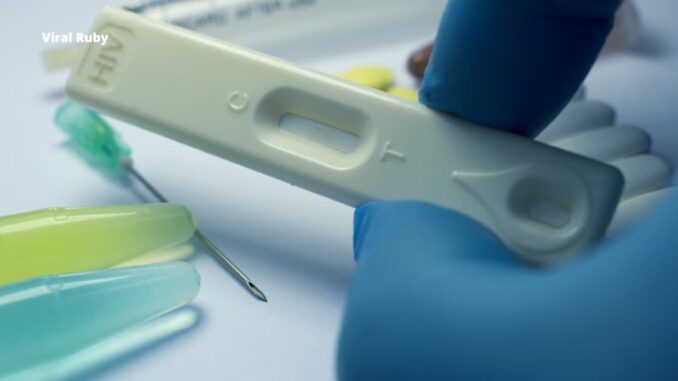
What Does a Non Reactive HIV Test Mean?
If you have been wondering what does a non reactive HIV test result mean, read this article. We will explain the reasons for nonreactive results and what it means for you. A nonreactive test result may also mean that you were not infected with HIV in a timely manner. It may mean that you were not exposed to the virus for a long enough time period to produce antibodies that will detect HIV.
What does non reactive HIV test mean? – Non Reactive HIV
What does a Non Reactive HIV test result mean? In simple terms, it means the HIV diagnostic test did not detect any HIV particles. A negative result means you are HIV negative, but it does not necessarily mean that you are free of the virus. If you recently acquired HIV, the HIV diagnostic test may have missed it, so you must wait at least 90 days after your HIV exposure to have another test. This is a good sign, as you can now schedule your next appointment with your healthcare provider.
Get Also: What Babies Do Faster Than College Students?
If you have been tested for HIV but have received a non-reactive result, you should go to a medical clinic. In the first place, your home test kit can only test your blood for HIV. In a specialist clinic, you can get a second and third HIV test. Your first test is extra sensitive, and it may react with other proteins. In contrast, the second and third tests use different parts of the HIV-related protein to determine if you’re infected. If you have two positive tests, you will be referred to a clinic for further testing.
Your local health department and state will report your HIV-positive results. If you don’t want your personal information to be shared, you should ask your health care provider to contact your state or local health department. If the result of your HIV test is positive, you should tell your partner your status. It is vital to protect your baby’s health, as it is possible for you to pass the virus to your unborn child during pregnancy, delivery, and breastfeeding. You can also protect yourself from HIV by using condoms and abstaining from sex.
What does non reactive HIV test results mean?
A non reactive HIV test result means the blood or fluid sample did not contain HIV antibodies or antigens. A nonreactive result does not necessarily mean the person is HIV negative, but it may also mean that the person took the test too soon and did not contract the virus recently. The negative results are confusing because they indicate the person does not have HIV and does not need to be treated. In these cases, further testing may be necessary.
Let Me Explain: Why Do Babies Grind Their Teeth?
Rapid Non Reactive HIV tests can give either reactive or non-reactive results. A reactive result means that antibodies to HIV were present in the blood, but no HIV virus itself. HIV antibodies are produced by the body in order to fight infections, but they cannot fight the virus on their own. If you have been exposed to HIV more than 6 weeks ago, you may have a non-reactive result. If you’re worried that the test didn’t pick up antibodies, you should schedule another visit to a doctor.
The results are not immediately clear, but Non Reactive HIV test results should be followed by medical care. If the test result is below 1.0, the patient should go to a doctor as soon as possible. If a positive result is found, you must get immediate antiretroviral therapy. An Non Reactive HIV test is easy to perform. You can prick your finger or take a sample of your blood in a vein.
What does HIV screening non reactive mean? – HIV Screening
What does Non Reactive HIV screening mean? Non Reactive HIV screening means that a person does not show symptoms of the disease, even if they have recently been infected with HIV. The virus attacks the immune system cells, which protect us against disease-causing germs. When this happens, we lose immune cells and may become unable to fight diseases and infections. Therefore, Non Reactive HIV screening is important to ensure that a person’s immune system is strong enough to withstand HIV infection.
Do you know: McDonalds Ty Beanie Babies 2021
A Non Reactive HIV screening result indicates that the test did not detect any HIV antibodies or antigens in a fluid sample. This does not necessarily mean that the person does not have HIV; it could simply mean that the person took the test too early or did not have the antibodies at the time of the test. A reactive HIV screening result, on the other hand, indicates that the test found antibodies and antigens in the person’s blood.
A non-reactive HIV test result is similar to a negative result. In this case, HIV antibodies and the virus were not detected in the blood sample. The test is usually conducted seven to forty-five days after the person last had possible exposure to HIV. In some cases, it can detect exposures six weeks or more before the test. If the test shows non-reactive results, then the person is HIV-negative.
Does reactive mean HIV positive? – Non Reactive HIV
In many cases, a test results that is non-reactive does not necessarily mean you are HIV positive. Oftentimes, a non-reactive result means that you took the test too soon after contact with HIV fluids. The window period is the time between contracting the virus and developing antibodies large enough to detect it. If the test results are non-reactive, then you have not contracted HIV. In such a case, you will need to return to your doctor.
See Also: Can Babies Have Honey Nut Cheerios?
Reactive results are positive, but they are not necessarily a sign of HIV infection. A non-reactive result may mean you have other illnesses or infections. A reactive HIV test means that you have HIV antibodies in your blood. Getting a second test is necessary to confirm the result of the first test. The third step is getting the test results and discussing them with your doctor. Always get the results. By following these steps, you can be confident that you do not have HIV.
A Non Reactive HIV antibody result is also a sign that you have HIV-2 infection. The antibodies to HIV-2 may cross-react with the HIV-1 antigens in an assay strip. In addition, you should seek confirmation if you receive a first-time positive result. It is important to note that HIV-2 coinfection is rare. Therefore, you should submit a plasma specimen for HIV-1 RNA detection.
What is the meaning of non reactive? – Non Reactive HIV
A Non Reactive HIV test result means the HIV virus or antibodies are not present in your blood. To get this result, you must be at least seven weeks after the last time you were exposed to HIV. However, the good news is that this can be done yourself at home. Here are some important steps to follow to ensure you are safe. First, make an appointment with your doctor or a health care provider. Usually, an HIV test is done at least once every 90 days. If you want to get a positive result, you should do it within 90 days of the last time you were exposed to HIV.
See Details: Food That Makes People Sick Will Often
HIV treatment consists of taking highly effective medicines. These medicines are called antiretroviral therapy (ART) and are used to control the virus in the blood. The medication helps HIV patients live healthy, long lives. However, it is important to get regular checks from your health care provider to make sure you are getting the right medicine for your specific condition. If you find out you are infected, the next step is to get treatment.
Is non reactive good for HIV test? – Non Reactive HIV
A Non Reactive HIV test results means you are not living with HIV. This type of result is given up to 30 days after being infected. However, there are risk factors that can affect a non-reactive test. Learn more about them. Non-reactive means that the test does not detect any antibodies to HIV. Some risk factors include:
Read Also: Sunset Soul Food and Seafood Restaurant
One factor that can affect a non-reactive HIV test is if the test kit has expired. Many test kits have expired dates, so it is important to follow the instructions carefully. Some tests interpret faint lines as reactive. If your test results are inconclusive, the HIV testing service provider will recommend testing again with another assay. If the results are reactive, the patient will be referred to a specialist clinic.
The time period between HIV contact and the emergence of antibodies or antigens is crucial for a good HIV test result. The window period between HIV contract and the presence of antibodies or antigens in the blood is called the “window period.” This window period may be too short, or it could be too long. To make sure you get the most accurate result, try retesting a few days after the first HIV exposure.

Leave a Reply